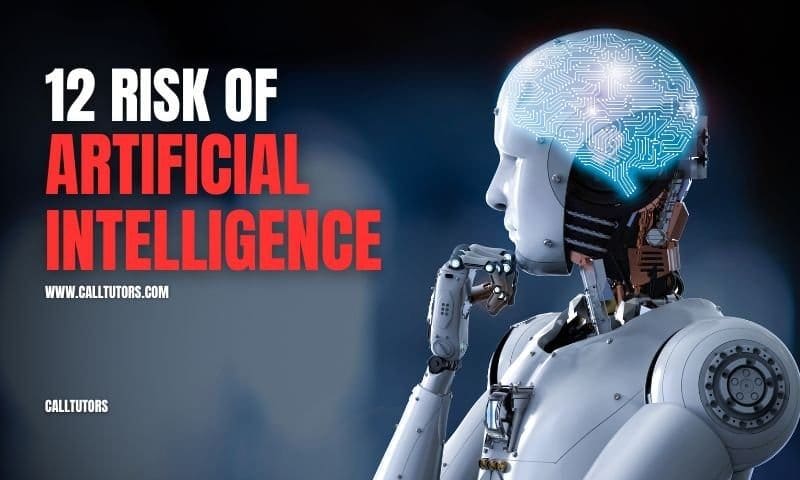Artificial Intelligence (AI) has become an integral part of our lives, revolutionizing industries and enhancing our everyday experiences. However, amidst the excitement and possibilities that AI brings, there are also significant risks that call for our attention. From job displacement to privacy concerns, navigating the dangers of AI requires a careful balance between technological advancements and safeguarding the well-being of individuals and society as a whole. In this article, we explore the potential pitfalls of AI and discuss strategies to mitigate these risks, ensuring a future where AI benefits us without compromising our values.
The Risks of Artificial Intelligence
Artificial Intelligence (AI) has become an increasingly prevalent and powerful force in today's society. While its potential benefits are vast and exciting, it is crucial that we also recognize and address the risks associated with this technology. In this article, we will delve into various ethical concerns, job displacement, privacy invasion, lack of accountability, bias and discrimination, unintended consequences, economic inequality, dependency on AI, security vulnerabilities, and the potential existential threat posed by AI.
Ethical Concerns
One of the most critical aspects of AI is its ethical implications. As AI systems become more advanced, it becomes essential to ensure that they align with human rights and moral values. The development and implementation of AI must prioritize the preservation of human dignity, safety, and privacy. Additionally, ensuring that AI is used for the betterment of humanity, rather than enabling harm, is of utmost importance.
Autonomous weapons are a prime example of ethical concerns surrounding AI. The deployment of AI-powered weapons could potentially lead to unpredictable and uncontrollable actions, leading to severe consequences. We must establish strict regulations and guidelines to prevent the misuse of AI in warfare, ensuring that human oversight and ethical considerations are prioritized.
Furthermore, AI has the potential to manipulate information and influence decision-making. With the ability to process vast amounts of data, AI systems can be exploited to spread misinformation, manipulate public opinion, and even sway political outcomes. It is vital to have safeguards in place to prevent AI manipulation and ensure that ethical decision-making is upheld.
Job Displacement
AI's ability to automate tasks that were previously performed by humans poses a significant risk to the workforce. In various industries, automation has already led to the loss of traditional jobs, and there is a growing concern that this trend will continue to accelerate. As AI systems become increasingly capable, more jobs may be at risk of being replaced by machines.
While automation has the potential to increase efficiency and productivity, it is crucial to address the impact on the workforce. Many individuals may find themselves displaced from their occupations, leading to job insecurity and economic hardships. Reskilling and education programs must be developed to help affected workers transition into new roles that require skills that AI cannot replicate.

This image is property of Amazon.com.
Privacy Invasion
The widespread use of AI raises significant concerns about privacy invasion. AI systems rely heavily on data collection, which can include personal and sensitive information. The potential for misuse and unauthorized access to this data poses a threat to individual privacy and autonomy.
Data collection and surveillance by AI systems can be exploited to discriminate against certain individuals or groups. Algorithms that are trained on biased datasets can perpetuate discriminatory practices and reinforce societal inequalities. It is crucial to ensure that AI technologies are developed and deployed in a manner that respects privacy rights and protects individuals from discrimination.
Additionally, the risk of data breaches and hacking cannot be ignored. AI systems that store vast amounts of personal data become attractive targets for malicious actors. Efforts must be made to implement robust security measures to protect sensitive information from unauthorized access and misuse.
Lack of Accountability
The lack of accountability surrounding AI systems is a significant concern. As AI becomes more autonomous and independent, determining liability becomes increasingly complex. The concept of “black box AI” refers to AI systems whose decision-making processes cannot be easily understood or explained by human operators. This lack of transparency creates challenges when attempting to assign responsibility for actions and outcomes.
To address this issue, it is essential to prioritize transparency and explainability in the development and deployment of AI systems. Efforts should be made to ensure that AI algorithms are auditable and that their decision-making processes can be comprehended by humans. Additionally, establishing clear regulatory frameworks and oversight mechanisms can help hold organizations accountable for the actions of their AI systems.

This image is property of www.calltutors.com.
Bias and Discrimination
Bias and discrimination are significant risks associated with AI. AI systems are trained on historical data, which may contain inherent biases. These biases can then be perpetuated and reinforced by AI algorithms, leading to discriminatory consequences in various domains, such as hiring processes, healthcare, and criminal justice.
Addressing data bias is crucial to mitigate the risk of discriminatory outcomes. Diversifying training datasets and rigorous testing can help identify and rectify biases in AI systems. Fairness and equality should be foundational principles in the development of AI algorithms to minimize discriminatory impacts.
Unintended Consequences
AI systems can have unintended consequences that go beyond their initial design and objectives. Unanticipated behaviors can emerge due to the complexity of AI algorithms and the interactions between different components. These unintended consequences can pose risks to both individuals and society at large.
Systemic bias reinforcement is one example of unintended consequences. If AI systems are trained on biased data or deployed in biased environments, they can perpetuate and amplify existing biases. This can lead to the entrenchment of social inequalities or exacerbate societal divisions.
Escalation of conflicts is another potential unintended consequence. AI systems used in military applications could make decisions that escalate conflicts without proper human oversight. It is crucial to carefully consider the potential consequences of AI deployment and ensure that human control and decision-making remain integral.

This image is property of miro.medium.com.
Economic Inequality
The impact of AI on economic inequality is a concern that must not be overlooked. Automation has the potential to concentrate wealth in the hands of a few, leading to increased inequality. As AI replaces jobs, individuals in occupations vulnerable to automation may face unemployment, while increasing the demand for highly specialized skills.
Job polarization is a phenomenon that can exacerbate economic inequality. AI's ability to automate routine tasks often affects middle-skill jobs, leaving a gap between high-skilled and low-skilled positions. This polarization can lead to a significant socioeconomic divide if not adequately addressed.
To prevent widening income disparities, proactive measures such as income redistribution, reimagining the labor market, and creating opportunities for skill development should be considered. Ensuring equitable access to resources, education, and fair employment practices can help mitigate the impact of AI on economic inequality.
Dependency on AI
As AI becomes more advanced and prevalent in various aspects of our lives, there is a growing concern about our increasing dependence on this technology. Overreliance on AI systems without developing our own skills and autonomy can lead to significant vulnerabilities.
Human dependence on AI can leave us ill-prepared to handle situations when AI systems fail or encounter limitations. It is crucial to strike a balance between utilizing the benefits of AI while also maintaining our own critical thinking abilities and decision-making skills. Exploring sustainable alternatives to AI and prioritizing human agency should be a key consideration in the deployment of AI systems.

This image is property of eightify.app.
Security Vulnerabilities
The rapid advancement of AI technologies also brings with it security vulnerabilities. AI systems can be targeted by hackers, leading to breaches of sensitive data or even malicious manipulation of AI algorithms. The potential consequences of such attacks can be far-reaching, ranging from privacy breaches to serious disruptions of critical infrastructure.
To mitigate security risks, robust cybersecurity measures must be implemented in the development and deployment of AI systems. Organizations should prioritize data encryption, secure network infrastructure, and regular vulnerability assessments. Collaboration between AI developers, cybersecurity experts, and policymakers can help identify and address emerging security challenges effectively.
Existential Threat
Perhaps the most significant risk associated with AI is the potential for it to pose an existential threat to humanity. Superintelligent AI, capable of surpassing human intellect and decision-making, could have unforeseen and catastrophic consequences if not properly controlled.
The development of uncontrolled AI, without adequate safeguards and oversight, could lead to a risk of human extinction. With the potential to surpass human capabilities in various domains, superintelligent AI could make decisions that are incompatible with human survival or objectives.
Mitigating existential risks posed by AI requires careful planning, international cooperation, and robust governance frameworks. Striking a balance between the development of AI technology and ensuring its alignment with human values and goals is crucial in mitigating the potential existential threat.
In conclusion, while Artificial Intelligence offers tremendous potential, it is essential to recognize and address the risks associated with its development and implementation. By carefully considering ethical concerns, job displacement, privacy invasion, lack of accountability, bias and discrimination, unintended consequences, economic inequality, dependency, security vulnerabilities, and the potential existential threat, we can navigate the dangers posed by AI and ensure a future that benefits all of humanity.








